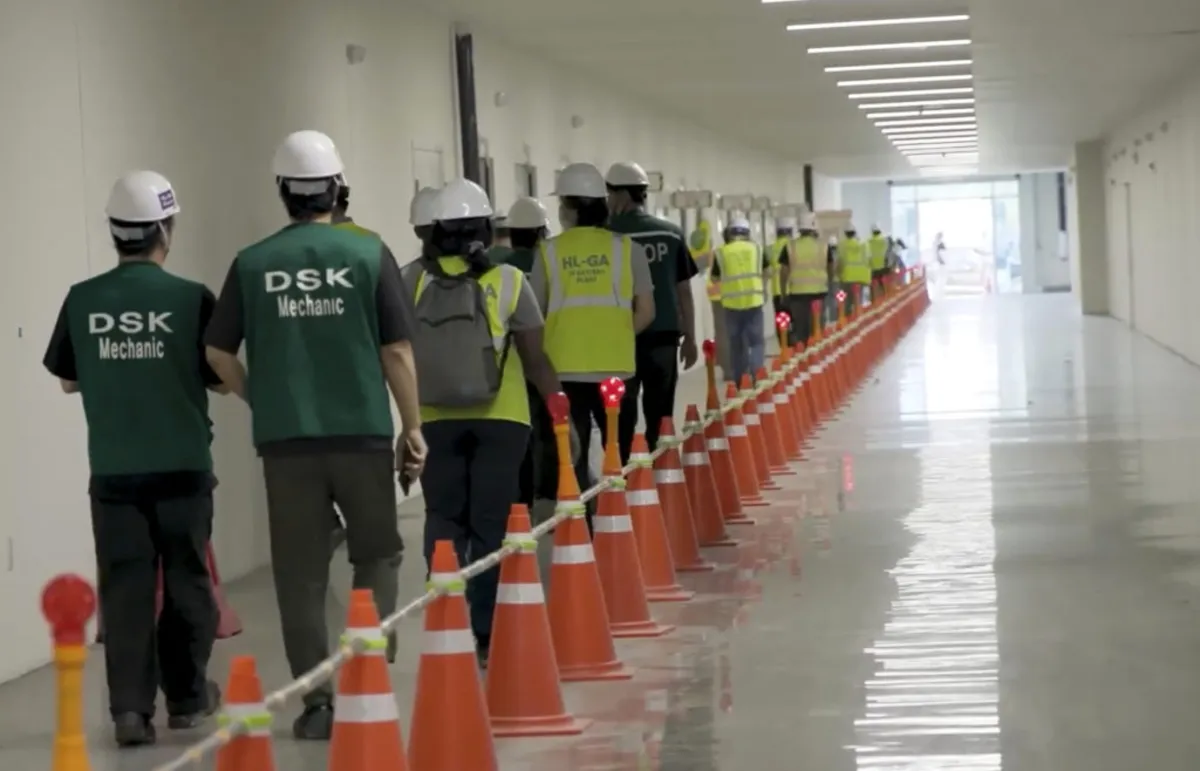
The recent raid conducted by U.S. Immigration and Customs Enforcement (ICE) at a Hyundai battery factory under construction near Savannah has led to the detainment of 475 workers, with more than 300 being South Korean nationals. According to immigration attorney Charles Kuck, most of these individuals were engineers or involved in after-sales service and installation. The alarming images released show some workers shackled with chains around their hands, ankles, and waists.
In response to this troubling situation, South Korea's foreign minister is scheduled to fly to the U.S. to negotiate the return of the detained citizens on a charter flight. Many South Koreans express feelings of confusion, shock, and betrayal over the incident. President Donald Trump has stated that these workers were in the U.S. illegally, suggesting that the country should instead train local citizens for specialized roles in fields such as battery and computer manufacturing.
However, attorney Kuck argues that no U.S. company manufactures the machinery used in the Georgia battery plant, necessitating the need for foreign workers to install and repair equipment. He emphasized that training a U.S. citizen for these specialized tasks could take three to five years. “This is not something new,” Kuck remarked. “We've been sending our folks abroad for years to handle similar situations.” He noted that Japanese and German companies have historically employed similar strategies, contributing to job creation in the U.S.
The details surrounding the workers’ visas remain undisclosed, but it’s commonplace for foreign firms to bring in workers from abroad to facilitate the establishment of U.S. factories and subsequently train local staff. Rosemary Coates, executive director of the Reshoring Institute, remarked on the parallels with Japanese and German car manufacturers who did the same in the 1980s and 1990s. Under a B-1 visitor for business visa, foreign workers can stay in the U.S. for up to six months, provided they are reimbursed for expenses while receiving a paycheck from their home country. Although there are restrictions on their roles, such as not being able to build but being allowed to install equipment if specified in a contract, these regulations are often navigated by companies.
During a recent press conference held at a church in Savannah, advocates called for the immediate release of the detained workers. Among them was Sarah Park, president of the Korean American Coalition of Atlanta, who highlighted the unique skills of the detained South Korean workers necessary for the battery plant's operations. Daniela Rodriguez, executive director of Migrant Equity Southeast, reported that families of detained immigrants from various Latin American countries have also been reaching out for help, fearing for their loved ones' safety.
Local labor leaders have raised concerns about Hyundai's use of South Korean workers for basic construction tasks that may violate visa waiver rules. Christi Hulme, president of the Savannah Regional Central Labor Council, accused Hyundai and its contractors of employing Korean workers for tasks such as pouring cement and erecting steel, which are typically reserved for local labor. “Basically, our labor was being given to illegal immigrants,” Hulme stated.
The raid has drawn criticism from South Korean politicians, with Foreign Minister Cho Hyun describing the operation as a “very serious matter.” Concerns have been raised regarding the implications of such actions on future investments by South Korean companies in the U.S. Lawmakers have even suggested retaliatory measures against Americans allegedly working illegally in South Korea. However, experts believe that significant retaliatory actions are unlikely due to South Korea's dependence on the U.S. for security against North Korea and other cooperative endeavors.
The raid marks one of the largest workplace operations by ICE as part of its mass deportation agenda, targeting Georgia, known for its strong business ties with South Korea. Only weeks prior, South Korea had committed to significant investments in the U.S. to foster tariff negotiations. The ongoing diplomatic relationship is under scrutiny as public sentiment in South Korea grows increasingly critical of the U.S. approach under President Trump.
In conclusion, the detainment of South Korean workers at the Hyundai plant has sparked widespread concern over immigration practices, labor regulations, and the future of U.S.-South Korea relations. As the situation unfolds, both countries will need to navigate the complexities of international labor and diplomatic ties carefully.